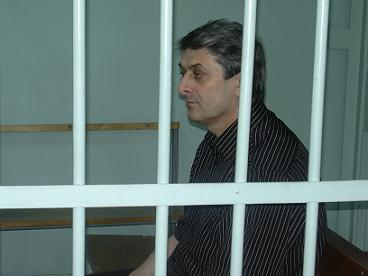The Israpilov case Artur Kazaryan, special to Prague Watchdog
The court case of Ibragim Israpilov, former prefect of the Shatoisky district in the then Chechen Republic of Ichkeria, ran for about two months behind closed doors. The Maskhadov-era official was charged with seven violations of the Russian penal code, including terrorism. On June 29, the court eventually found him guilty and sentenced to 20 years in prison.
According to law enforcers, Israpilov supplied the explosives used in the September 2003 bombing of the Kislovodsk – Mineralnye Vody train near the Podkumok station in the Predgorny district of the Stavropolsky region, south Russia. The bombs were planted under the railway tracks and were set off as the train passed. Five people died in the blasts and more than 80 were injured.
When Israpilov was arrested in the Predgorny district in December 2003, Federal Security Service (FSB) agents found TNT, plastic explosives, two electric detonators, two grenades, radio transmitter components, and a handgun in his car.
The press was barred from the courtroom and were only admitted when the case ended, but only to hear the judge pronounce sentence. And even then they were forbidden to make tape recordings or take any photographs (bailiffs collected all their equipment upon entering).
Israpilov pleaded guilty to the charges that he used a fake passport and driver’s license and that he transported explosives to Stavropol. He insisted he knew nothing about what all this equipment was to be used for; his job was simply to deliver it.
Nor did he deny being acquainted with Ichkerian President Aslan Maskhadov, and Aslan Dautov, former Ichkerian Minister of Industry. He also admitted to being on friendly terms with Doku Umarov, former chairman of the Security Council of the Chechen Republic of Ichkeria, who asked him to drive the car with the explosives to Stavropol.
After the federal troops arrived in Chechnya, Israpilov went into hiding, fearing repressions. Since 2000, and up until his arrest, he had been working for Umarov, handling food and medical supplies.
In a brief address to the press, Israpilov stressed that he was for peace in Northern Caucasus and had never been a supporter of Wahhabism.
Nevertheless, the court found Ibragim Israpilov guilty and sentenced him to 20 years in a maximum-security prison.
The defence did not comment on the sentence, saying that they have to familiarize themselves with it. The Russian Prosecutor General’s office was completely satisfied with the court ruling; relatives of the victims, however, were not and announced that for a man who aided and abetted terrorists, this sentence was far too lenient.
Artur Kazaryan is a free-lance journalist. (D/E,T)
DISCUSSION FORUM
|

